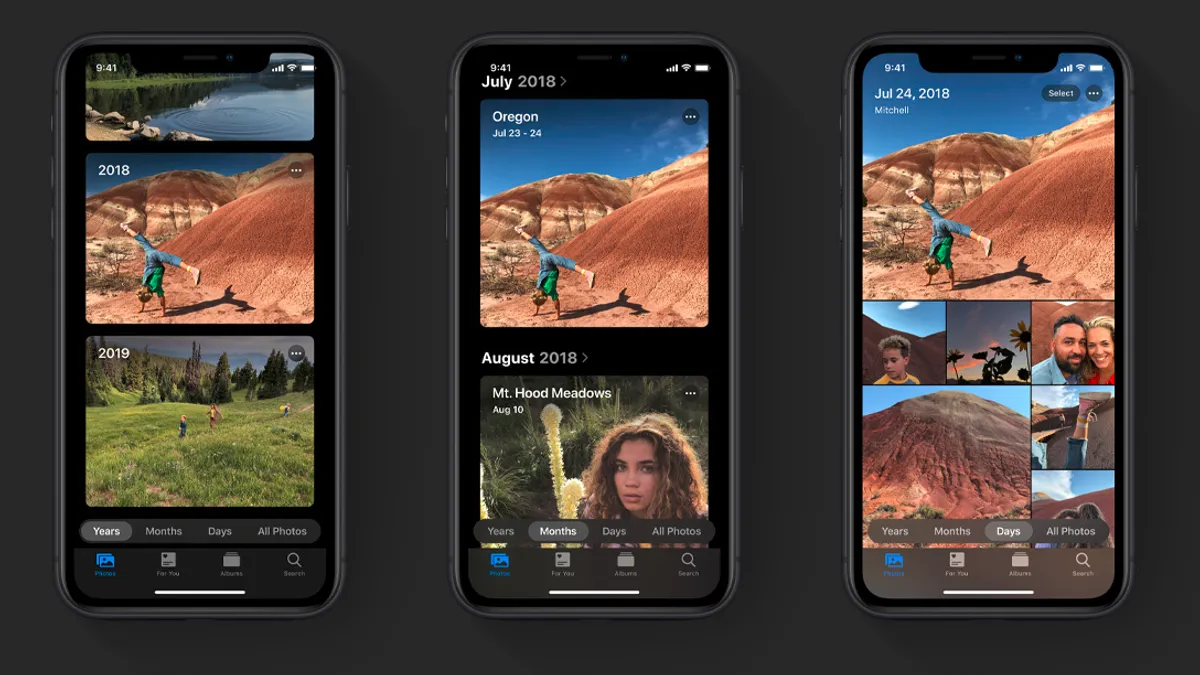Brief:
- Apple's Worldwide Developers Conference brought a slew of announcements about the company's products, including more privacy controls that take aim at the data-collection practices of Facebook and Google. Apple's next mobile operating system, iOS 13, will have a "Sign in With Apple" that can conceal the email addresses of iPhone users, per an announcement. Users sign in to apps with their Apple ID, and apps can only ask for their name and an email address, with the option to create a unique email address that forwards to users' real one.
- IOS 13 will also tell iPhone users if apps are tracking location in the background, and it will block apps from using Wi-Fi and Bluetooth connections to determine a user's location. Apps will have to ask iPhone users each time they want to access that user's location.
- Apple also said it will eliminate iTunes from Mac computers, something that the company already had done with iPhones and iPads by creating separate apps for music, video and podcasts. The tech giant unveiled a separate App Store for the Apple Watch that makes the wearable device more independent of iPhones.
Insight:
Apple used its annual developers conference to take aim at the data-collection practices of Facebook and Google, which depend on highly accurate consumer data to provide mobile marketers with ad-targeting capabilities. But as criticism mounts about the lack of transparency into how tech companies gather people's personal information, Apple seeks to differentiate its platform from rivals with its greater privacy protections.
The "Sign in With Apple" feature will be a direct competitor to similar sign-in services offered by Facebook and Google. The services let the companies collect and share consumer data. Apple's protections promises to be stronger by letting customers avoid sharing an email address to sign into third-party services. The improved privacy features of iOS 13 may limit the ability of advertisers to reach target groups of iPhone users, with 29% of consumers saying they permanently enable location tracking on their phones, per a survey by location intelligence company Blis. Eighty-three percent of U.S. consumers are aware that marketers track their locations, but only 33% permanently disable location tracking on their phones, the survey found.
IOS already has an edge over Android thanks to more granular location sharing permissions, and its announcements at WWDC doubled down on these, per comments from Mike Herrick, Airship's SVP of technology, that were emailed to Mobile Marketer.
"Additional efforts like Apple ID rather than a social login and offering anonymized email addresses for each app reinforces Apple's strong consumer privacy position," Herrick said. "These ideas of course make a lot of sense given Apple's long held position and its relative independence from ad dollars — not to mention growing data regulations like GDPR."
Apple is also making augmented reality (AR) much easier to use for developers outside of gaming, ArcTouch's founder and CXO Adam Fingerman said in comments emailed to Mobile Marketer. At WWDC, Apple announced RealityKit, RealityComposer and an improved ARKit.
"These new tools include ready-made assets and content that developers can easily plug into apps," Fingerman said. "We expect this will be an enabler for a flood of new AR apps in the coming months."
While a newly announced voice control feature for Siri should make it easier for developers to add voice-driven features to apps, Apple failed to show how it's committed to supporting first-class conversational apps, Fingerman said.
"For a company that's known for its incredible story-telling, Apple still hasn't articulated a cohesive vision for how Siri and voice assistants fit into the home," Fingerman said.
WWDC took place at the same time that federal scrutiny of tech giants appears to have intensified. The U.S. Justice Department and the Federal Trade Commission, the federal government's top antitrust authorities, recently agreed on how to divvy up responsibilities into investigating possible anticompetitive behavior by Apple, Amazon, Facebook and Google, Reuters reported. Apple may face the most scrutiny for its management of the App Store, which is the only source of third-party apps for iPhones and iPads.










